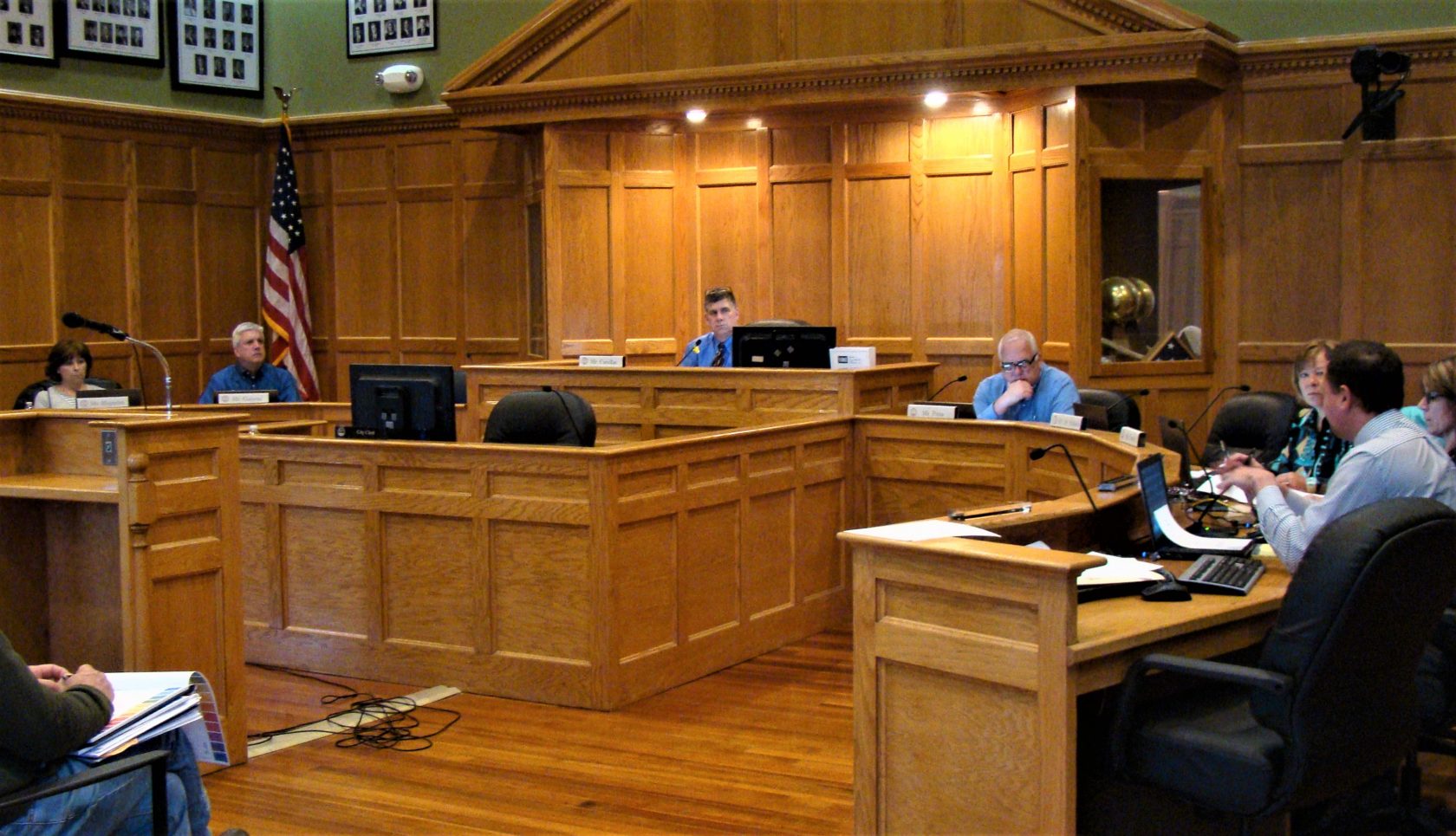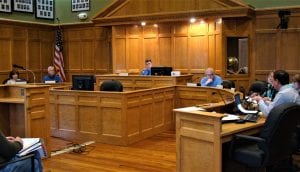
The Planning Board reviewed a new short term rental ordinance at its meeting Tuesday. (Photo by Amy Porter)
WESTFIELD – At Tuesday’s Planning Board meeting, chairman William Carellas said the City Council asked the Planning Board for their input on a zoning ordinance amendment for short term residential rentals.
Ward 4 Councilor Michael Burns gave a history of the ordinance, which was created following numerous complaints from residents on Overlook Drive regarding an AirBnB rental on the street. At the time, the building inspector said that no ordinance existed to regulate the AirBnB , which was being used as a party house.
Work on the local ordinance stopped in May because the state had introduced a bill. In December, Governor Charles Baker signed a bill regulating short term rentals.
City planner Jay Vinskey said that Attorney Shanna Reed wrote the ordinance based in part on ones in Salem and Manchester-by-the-Sea.
Burns said more and more cities and towns are creating local ordinances. He added that he had received a letter from a couple on Grove St. who ran a successful AirBnB . “We need to keep them in mind. There are at least seven or eight in Westfield,” he said.
Vinskey explained that they had to strike a balance between the ability to have a short term rental, and putting in some safeguards. He said the City Council is looking for recommendations from the Planning Board. He said now someone can buy a house and rent it out daily, weekly or monthly, without a permit. The ordinance would establish a local registry, and require a zoning permit from the building inspector.
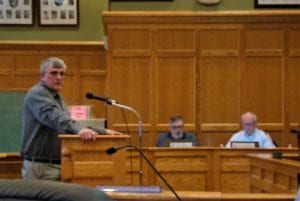
Ward 4 Councilor Michael Burns presented the ordinance to the Planning Board. (Photo by Amy Porter)
Burns said the City Council will look at it at Monday’s (April 22) meeting. “We want a new piece of legislation. It’s not perfect, but it’s a start,” Burns said.
“I think it’s a great idea,” said Carellas, adding that he would like to see a yearly limitation on number of days allowable to rent on the permit.
Vinskey said the short term rental must be the residence of the owner. Carellas asked if “snow birds,” residents who go south for the winter, would be able to rent their home for five months. Vinskey said the ordinance limits short term rentals to seven days, but they could be rented four times a month.
New Planning Board member Richard Salois suggested that the building inspector review the permit annually. “These things make sense. There are not a lot of hotel rooms in Westfield,” he commented.
Vinskey said the ordinance does state every 12 months for the permit, but that he would clarify that language in the ordinance. “It’s not intended as something you can pull. This is written to provide the standards. If they’re meeting all of those, it’s a by right use.
Planning Board member Bernard Puza said the state has a new law taxing short term rentals at 5.7%, just like hotel rooms. “Is the city collecting taxes,” he asked. Vinskey said not yet, because they waited for the state to finalize their legislation.
Planning Board member Cheryl Crowe asked whether the city will inspect the homes. Burns said the Fire Department will inspect.
Crowe added that she goes to an AirBnB that has strict regulations about parking, and also limits on the number of people based on the number of bedrooms. “It doesn’t hurt to add a few things, to give it more strength,” Crowe said. Later in the meeting, Carellas said he believed this would be unenforceable.
Planning Board member Jane Magarian said under rental duration, the ordinance states 13 consecutive hours. Vinskey said that basically means per day.
Planning Board member John Bowen asked whether it made sense to put in the language that the homeowner is 100% responsible whether present or not. Carellas said state law has required $1 million liability to cover each short term rental.
Carellas then opened the hearing to several residents from Overlook Drive who Burns said wanted to speak to the issue.
“You’re all adults. You’re not looking at this from a college perspective. They should definitely be held to a permit every six months. There is no check or background on these people. You’ve got a neighborhood that is Residence A. We bought Residence A for a reason,” said Overlook Drive resident Dick Holcomb.
Carellas asked him what he would suggest. Holcomb said a cap on the number of times it would be allowed to be listed.
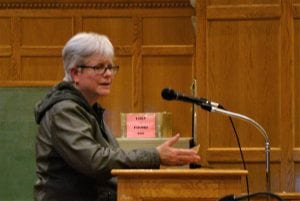
Overlook Dr. resident Ellen Fenton spoke during the public hearing. (Photo by Amy Porter)
Frank Mills said he had been an Overlook resident since 1962. “We’ve come to expect the protections afforded by paying taxes,” he said, adding that he had looked into the residence on Overlook Dr. that was used as an AirBnB. He said it was rented by an 18-year-old woman who held parties, and invited people from surrounding cities.
“Residence A precludes any commercial activity of any kind. The AirBnB was clearly a commercial entity. Our right and expectation as property owners is to have you look after us,” Mills said, adding there are two opposing viewpoints and competing interests: property owners with short term rentals, a commercial enterprise, versus property owner rights. “It seems to fly in the face of property owner protections, and should not be provided in Residence A,” he said.
Ellen Fenton said she lives on Overlook Dr. directly across from the house in question. “I went away for a weekend, and a light pole came down,” she said, referring to an incident where one of the party goers hit the pole. She said beer cans were on the lawn for 10 days after that. She said she has stayed in AirBnB’s in Europe, and favored limiting guests by the number of bedrooms.
Fenton also asked if someone has to be 21 to rent a room, explaining that Overlook Drive is in a special situation, enclosed on three sides by Westfield State University. “To me, I think people should be 21,” she said. Carellas said the legal contract age is 18.
Fenton also asked about food service. Vinskey said that would be in a separate category as a Bed & Breakfast. Short term rentals would not involve serving food to people, as opposed to a B&B.
Richard Farrell said the residents of Overlook Dr. learned “an awful lot about AirBnB’s over two weeks. “We went to the City Council, and the next night, someone knocked down the light,” he said. Farrell said he agreed that short term rentals should not be allowed in Residence A.
“I have a copy of the state proposal. Also allows local communities to levy a 6% excise tax, and a 3% impact tax. The city would have to have an office to oversee all of this,” Farrell added.
At-large City Councilor Dan Allie asked for a clarification, on whether a short term rental is considered a commercial enterprise.
Vinskey said the way it’s written, it’s a residential use, although the overall activity is a commercial endeavor. “If you’re renting it as a dwelling, and living in it as a residence, it’s residential use,” he said.
“Do we have a way to know people are living there at least part of the year,” Allie asked. Vinskey said to qualify as a resident, they must reside more than half the year. Planning Board member Robert Goyette said that would be the difficult part. “It’s like Florida residency – everyone says I’m there six months and one day.”
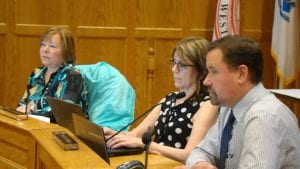
Planning Board member Cheryl Crowe, Kristine Fedora and Jay Vinskey of Planning Dept. (Photo by Amy Porter)
Vinskey said the residency requirement in the ordinance distinguishes it from a house that was bought to rent out. He added that there must be a local contact person listed in the short term rental ordinance.
“What you have in front of you is a good start. You have a lot of good suggestions. Anything we put in here can be changed. We should do the best we can. Thanks for everyone looking it over – I appreciate it,” said Ward 6 Councilor William Onyski, who chairs the Legislative & Ordinance Committee.
Crowe asked how the ordinance would affect existing AirBnB’s, and whether they would have to comply with it. Vinskey said from a zoning perspective, “you can’t retroactively apply regulations.” But he added they would be subject to the state law.
The hearing was closed, and the Planning Board voted to recommend the ordinance with two additional recommendations: clarifying the annual review of the permit, and limiting the maximum number of days allowable.
Vinskey asked to what number, and Carellas said their recommendation was to limit it. “It restricts the ‘let’s make this a business’ aspect,” he said.
“I think you guys did a great job on this,” Carellas said to the city councilors at the meeting.

